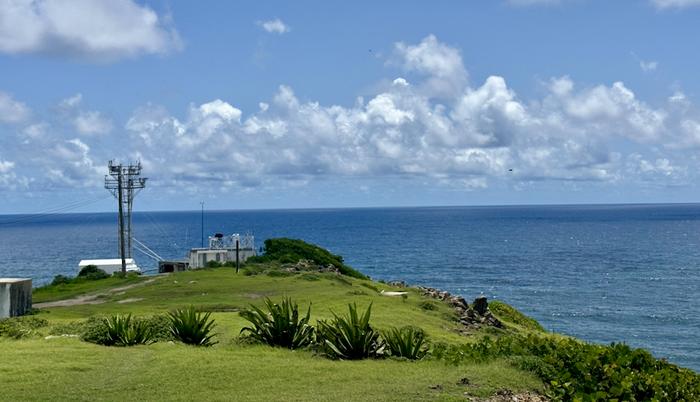The observatory has been used to document the transport of Saharan dust particles across the Atlantic Ocean to the Caribbean, creating the longest-running dust data set in existence. Scientists from many different disciplines use the data to understand how dust particles impact everything from coral reef health to cloud formation and tropical storms.

Credit: Aubrey Rion, University of Miami
The observatory has been used to document the transport of Saharan dust particles across the Atlantic Ocean to the Caribbean, creating the longest-running dust data set in existence. Scientists from many different disciplines use the data to understand how dust particles impact everything from coral reef health to cloud formation and tropical storms.
Through a grant from the National Science Foundation (NSF), the University of Miami Rosenstiel School of Marine, Atmospheric, and Earth Science recently completed a major upgrade to its Barbados Atmospheric Chemistry Observatory (BACO), expanding its capability to study how tiny African dust particles affect clouds, climate, and air quality.
Operating the observatory has been a long-term collaboration between the Rosenstiel School, the Max Planck Institute for Chemistry and the Caribbean Institute for Meteorology and Hydrology (CIMH)
The improvements also include expanded monitoring and data collection capabilities. The enhanced datasets will provide researchers better real time insights into regional and global air quality and help to improve short and long-term air quality predictions as well as seasonal, sub-seasonal and long-term climate model predictions.
“The funding from NSF is facilitating more than an upgrade, it’s really a rebirth, a reimagining of the oldest and longest-running dust observation and recording station in the world,” said Cassandra Gaston, associate professor of atmospheric sciences at the Rosenstiel School. “This 60-year record continues to this day due to the dedication of our technicians who oversee the daily measurements in Barbados.”
BACO was constructed at the easternmost end of Ragged Point, St. Philip, Barbados in 1966 by Rosenstiel School professor emeritus Joseph Prospero, Ph.D., a renowned marine and atmospheric chemistry researcher. Prospero conducted pioneering research on dust plumes from the Saharan air layer that travel thousands of miles across the Atlantic and deposit in the Caribbean. Prospero had big plans for the observatory and determined Barbados was a prime location to observe and collect dust and other atmospheric aerosols.
The upgrade consists of a complete replacement of the observatory’s 3½-story tower, and the installation of several state-of-the-art instruments and technology that will provide Gaston and her collaborators the ability to take measurements for improved climate modeling and predictions, and to explore the impact of dust on clouds, climate, and air quality.
“The new instruments will allow us to take measurements we’ve never been able to do before.” Gaston said.
The grant also supports the training and professional development of Barbadian and Caribbean scientists, fostering the growth of local and regional expertise in atmospheric research, a major goal of Prospero’s when he set out to build the observatory in Barbados.
The upgrade coincides with the Barbados segment of the Moisture and Aerosol Gradients/Physics of Inversion Evolution (MAGPIE) field experiment, conducted by the Rosenstiel School, the Naval Research Lab, the National Oceanic Atmospheric Administration (NOAA), and other U.S. research institutions and the Caribbean Institute for Meteorology and Hydrology.
The MAGPIE experiment began in August 2023 and runs through August 2024. It focuses on studying atmospheric boundary layer dynamics, the transport of moisture and aerosol-cloud interactions. This collaboration aims to further our understanding of atmospheric processes in the Caribbean region.
“The MAGPIE field experiment is a unique opportunity to study the complex relationship between moisture, aerosols, and meteorological phenomena,” said Andrea Sealy, Ph.D., a meteorologist at CIMH. “Through this study, we will gain invaluable insights into the atmospheric processes that impact our region. This collaboration will contribute to the global body of atmospheric knowledge but also empower local and regional scientists and institutions to take a leading role in addressing regional climate challenges.”
Method of Research
News article
Subject of Research
Not applicable




